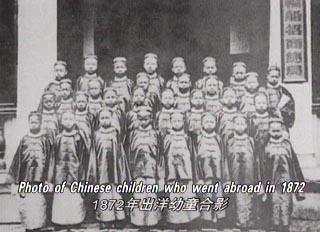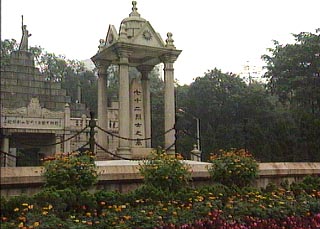 |
|
Delayed Reform (4)
Sending Students Abroad |
| CCTV.COM 2002-05-17 06:05:32 |
|
 Rong Hong, a Chinese, was buried at a cemetery in Hartford, capital of Connecticut, USA. In 1872, he headed more than 120 Chinese children coming to the United States. This was the first group of Chinese students sent by the Qing government to study abroad. Rong Hong, a Chinese, was buried at a cemetery in Hartford, capital of Connecticut, USA. In 1872, he headed more than 120 Chinese children coming to the United States. This was the first group of Chinese students sent by the Qing government to study abroad.
Zhan Tianyou was a typical example of those children. The term "studying abroad" was unfamiliar to the Chinese in those days.
 Since the Qing government could not enroll children from wealthy families, most of the students came from poverty-stricken families. Since the Qing government could not enroll children from wealthy families, most of the students came from poverty-stricken families.
Zhan Tianyou's father heard that it would take 15 years for the children to study abroad and that their safety would not be guaranteed. So he didn't have the heart to let his son leave home. But he had no choice but to sign the application form for his son to study abroad.
Conservative officials at the imperial court were disturbed to learn that the students were full of vigour and vitality in the United States. In 1881, the Qing government ordered the withdrawal of those students. Only Zhan Tianyou and another student finished their studies. He became a famous railway engineer. The railway from Beijing to Zhangjiakou, constructed under the supervision of Zhan Tianyou as the chief engineer, was a classic in the history of railways in China.
Another student, Shen Shouchang, served in the Northern Fleet after he returned from his studies in the United States. He was the first mate of the warship Zhiyuan during the Sino-Japanese War of 1894-1895. His head was hit by a cannon ball in a naval battle. He laid down his life at the age of 32.
At the beginning of the 20th century, a large number of students went abroad to carry on their studies. After the War of 1900, sending students abroad became an important part of the new policies. Within two years, the Qing government issued two imperial edicts encouraging young people to study abroad.
Japan had experienced the Meiji Reform. It was not far away from China and its cultural traditions were similar to those of China. So it was the first preference for many Chinese students. Zhang Zhidong said it was better to study in Japan than in the Western countries. His view found much support among the young people.
 Most outgoing students in North China took ships at Tianjin to make their voyage to Japan. Open to the outside world, Japan became a source of ideas for democratic revolution in China. Most Chinese students in Japan were enthusiastic for political activities. Most outgoing students in North China took ships at Tianjin to make their voyage to Japan. Open to the outside world, Japan became a source of ideas for democratic revolution in China. Most Chinese students in Japan were enthusiastic for political activities.
Among the 72 heroes who laid down their lives in the Huanghuagang Uprising in 1911, eight had studied in Japan.
Shen Xingong studied at a college in Tokyo. After he returned to China, he taught music at a primary school attached to Nanyang High School. The collection of songs he compiled for school children was the first collection of songs with numbered musical notation in China.
Chinese students brought the art of modern drama back to China. The Spring Willow Society was founded by Chinese students in Tokyo in 1906. It staged the modern drama La Traviata. To act the leading lady well, Li Shutong ordered the costume with his own money and shaved off his treasured beard.
There were not many Chinese students in the United States, but quite a few of them were outstanding figures. In 1905, the three Soong sisters went to Wesleyan College for women in Macon, Georgia, USA one after another. Wang Chonghui went to the United States in 1901. When he graduated from Yale University, he came first in the department of law.
He delivered a speech at the graduation ceremony on behalf of more than 4,000 students of the university. His success was covered by the local newspapers. Later he became the first foreign minister of the republic.
"How Can I Not Miss Her" was the title of a song written by two students studying abroad. It expressed the strong attachment of Chinese students studying abroad to their motherland.
|
|
|
|
|
|
|
 |









